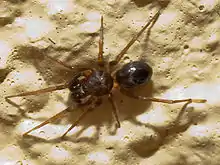Phrurolithus
Phrurolithus is a genus of araneomorph spiders first described by C. L. Koch in 1839.[2] First placed with the Liocranidae, it was moved to the Corinnidae in 2002,[3] then to the Phrurolithidae in 2014.[4]
| Phrurolithus | |
|---|---|
 | |
| Phrurolithus sp. | |
| Scientific classification | |
| Kingdom: | Animalia |
| Phylum: | Arthropoda |
| Subphylum: | Chelicerata |
| Class: | Arachnida |
| Order: | Araneae |
| Infraorder: | Araneomorphae |
| Family: | Phrurolithidae |
| Genus: | Phrurolithus C. L. Koch, 1839[1] |
| Type species | |
| P. festivus (C. L. Koch, 1835) | |
| Species | |
|
81, see text | |
Species
As of April 2019 it contains eighty-one species:[1]
- P. absurdus Gertsch, 1941 – USA
- P. adjacens Gertsch & Davis, 1940 – Mexico
- P. aemulatus Gertsch, 1941 – USA
- P. alatus Ivie & Barrows, 1935 – USA
- P. annulus Zhou, Wang & Zhang, 2013 – China
- P. anticus Wang, Chen, Zhou, Zhang & Zhang, 2015 – China
- P. apacheus Gertsch, 1941 – USA
- P. apertus Gertsch, 1935 – USA
- P. approximatus Gertsch & Davis, 1940 – Mexico
- P. banksi Gertsch, 1941 – USA
- P. bifidus Yin, Ubick, Bao & Xu, 2004 – China
- P. callidus Gertsch, 1935 – USA
- P. camawhitae Gertsch, 1935 – USA
- P. cangshan Yang, Fu, Zhang & Zhang, 2010 – China
- P. catalinius Gertsch, 1941 – USA
- P. celatus Fu, Chen & Zhang, 2016 – China
- P. claripes (Dönitz & Strand, 1906) – China, Russia (Sakhalin), Taiwan, Japan
- P. coahuilanus Gertsch & Davis, 1940 – Mexico
- P. concisus Gertsch, 1941 – USA
- P. connectus Gertsch, 1941 – USA
- P. coreanus Paik, 1991 – Korea, Russia (Kurile Is.), Japan
- P. corsicus (Simon, 1878) – Spain, France (Corsica), Italy (Sardinia) to Romania
- P. daoxianensis Yin, Peng, Gong & Kim, 1997 – China
- P. debilis Gertsch & Davis, 1940 – Mexico
- P. dianchiensis Yin, Peng, Gong & Kim, 1997 – China
- P. diversus Gertsch & Davis, 1940 – Mexico
- P. dolius Chamberlin & Ivie, 1935 – USA
- P. duncani (Chamberlin, 1925) – USA
- P. emertoni Gertsch, 1935 – USA
- P. fanjingshan Wang, Chen, Zhou, Zhang & Zhang, 2015 – China
- P. faustus Paik, 1991 – Korea
- P. festivus (C. L. Koch, 1835) (type) – Europe, Turkey, Caucasus, Russia (Europe to Far East), Kazakhstan, China, Korea, Japan
- P. flavipes O. Pickard-Cambridge, 1872 – Lebanon, Israel
- P. florentinus Caporiacco, 1923 – Italy
- P. goodnighti Muma, 1945 – USA
- P. hamatus Wang, Zhang & Zhang, 2012 – China
- P. hamdeokensis Seo, 1988 – Russia (South Siberia, Far East), Korea
- P. kastoni Schenkel, 1950 – USA
- P. kentuckyensis Chamberlin & Gertsch, 1930 – USA
- P. labialis Paik, 1991 – Korea, Japan
- P. lasiolepis Fu, Chen & Zhang, 2016 – China
- P. leviculus Gertsch, 1936 – USA
- P. longus Fu, Chen & Zhang, 2016 – China
- P. luppovae Spassky, 1941 – Tajikistan
- P. minimus C. L. Koch, 1839 – Europe
- P. nemoralis Bryant, 1940 – Cuba
- P. nigerus Yin, 2012 – China
- P. nigrinus (Simon, 1878) – Central and southern Europe
- P. nipponicus Kishida, 1914 – Japan
- P. oabus Chamberlin & Ivie, 1935 – USA
- P. palgongensis Seo, 1988 – Russia (Far East), China, Korea
- P. paludivagus Bishop & Crosby, 1926 – USA
- P. parcus (Hentz, 1847) – USA
- P. pennatus Yaginuma, 1967 – Russia (South Siberia, Far East), China, Korea, Japan
- P. pinturus Ivie & Barrows, 1935 – USA
- P. pipensis Muma, 1945 – USA
- P. pullatus Kulczyński, 1897 – Central Europe to Central Asia
- P. pygmaeus Thorell, 1875 – Ukraine, Russia (Europe)
- P. qiqiensis Yin, Ubick, Bao & Xu, 2004 – China
- P. schwarzi Gertsch, 1941 – USA
- P. shimenensis Yin, Peng, Gong & Kim, 1997 – China
- P. similis Banks, 1895 – USA
- P. singulus Gertsch, 1941 – USA
- P. sinicus Zhu & Mei, 1982 – Russia (South Siberia, Far East), China, Korea, Japan
- P. sordidus Savelyeva, 1972 – Kazakhstan
- P. spinosus Bryant, 1948 – Hispaniola
- P. splendidus Song & Zheng, 1992 – China, Japan
- P. subannulus Fu, Chen & Zhang, 2016 – China
- P. subnigerus Fu, Chen & Zhang, 2016 – China
- P. szilyi Herman, 1879 – Portugal, Spain, Central to south-eastern Europe
- P. tamaulipanus Gertsch & Davis, 1940 – Mexico
- P. taoyuan Fu, Chen & Zhang, 2016 – China
- P. tepejicanus Gertsch & Davis, 1940 – Mexico
- P. thracia Komnenov & Chatzaki, 2016 – Greece
- P. umbratilis Bishop & Crosby, 1926 – USA
- P. validus Fu, Chen & Zhang, 2016 – China
- P. wallacei Gertsch, 1935 – USA
- P. wanshou Yin, 2012 – China
- P. zhejiangensis Song & Kim, 1991 – China
- P. zhouyun Wang, Chen, Zhou, Zhang & Zhang, 2015 – China
- P. zongxu Wang, Zhang & Zhang, 2012 – China
References
- "Gen. Phrurolithus C. L. Koch, 1839". World Spider Catalog Version 20.0. Natural History Museum Bern. 2019. doi:10.24436/2. Retrieved 2019-05-22.
- Koch, C. L. (1839). Die Arachniden.
- Bosselaers, J.; Jocqué, R. (2002). "Studies in Corinnidae: cladistic analysis of 38 corinnid and liocranid genera, and transfer of Phrurolithinae". Zoologica Scripta. 31. doi:10.1046/j.1463-6409.2002.00080.x.
- Ramírez, M. J. (2014). "The morphology and phylogeny of dionychan spiders (Araneae: Araneomorphae)". Bulletin of the American Museum of Natural History. 390: 343.
External links
 Media related to Phrurolithus at Wikimedia Commons
Media related to Phrurolithus at Wikimedia Commons
This article is issued from Wikipedia. The text is licensed under Creative Commons - Attribution - Sharealike. Additional terms may apply for the media files.